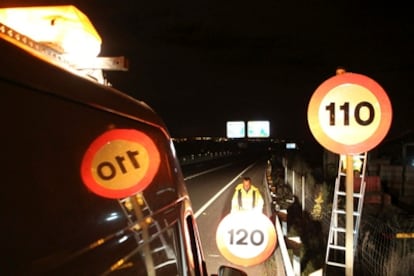Government and motorists' groups take separate routes on speed limits
Little consensus exists on whether the new law is geared to save fuel costs
"Lowering the speed limit to 110 kilometers per hour is about saving gasoline ? period." So said Deputy Prime Minister Alfredo Pérez Rubalcaba on Tuesday. If he was hoping his words would end the controversy prompted by the government's decision, announced on February 25, he was mistaken.
Since then, environmentalists and road-safety campaigners have called on the government to extend the "exceptional and temporary" measure throughout Spain's 8,000 kilometers of road permanently.
The new speed limit on Spanish highways goes into effect today and will remain in place until June 30.
Drivers' associations have said that the move will do little to improve road safety, and say that the government needs to think about increasing the limit above 120 km/h, such as in Germany and the Netherlands. Even the UK is talking about raising the limit to 128 km/h, or 80 mph.
The Spanish Royal Automobile Club, RACE, says it doubts that in itself, simply lowering the speed limit will do much to save fuel, and says that "education about responsible fuel use," along with measures to promote the use of public transport would make more sense.
The Catalan Royal Automobile Club describes the move as "incoherent," adding that introducing 30 km/h zones in cities will lead to more pollution and inefficient use of gasoline.
That said, the two measures have different ends, according to the government. A 30 km/h limit in some urban areas is about saving lives. A 110 km/h limit on motorways, as the government says, is about energy saving. But will it also save lives? In 2009, 89 people were killed on toll roads, and 377 on motorways, making up a quarter of the 1,903 people killed on the roads. In a third of those accidents, excessive speed was deemed the cause.
On Friday, Rubalcaba responded to Formula 1 driver Fernando Alonso, who said that lower speed limits could cause people to fall asleep at the wheel. The deputy prime minister said that officials introduced lower limits in Britain, where Alonso's road rival Lewis Hamilton hails from. "He doesn't fall asleep," Rubalcaba quipped.
The government has also been quick to dismiss accusations that the new limit is aimed at generating more revenue from speeding fines.
But road-safety campaigners are hopeful that the new law will see a reduction in road deaths. "If it can show it reduces the number of accidents, we will demand that the new limit be made definitive," said Francisco Canes, head of a nationwide association of traffic accident victims.
Environmentalists back the new measures, but say that they do not go far enough. "We see them as reasonable and positive, but insufficient," says Paco Segura of Ecologists in Action, which is calling for long-term energy-saving measures.
But motorists' associations have been arguing that the speed limit needs to be raised to 130 km/h, saying that Spain has one of Europe's most modern motorway networks, and that modern cars are more efficient at higher speeds.
"Most countries that have increased their speed limits have seen an increase in road deaths," says Pere Navarro, the head of the DGT traffic directorate, responsible for Spain's roads. He points to the experience of Denmark, which in 2004 raised the limit from 120 to 130 km/h. "There was a 20-percent increase in road deaths in the first year, because people drove faster on all roads," he says. The country lowered the limit back down to 110 a year later.
The EU, the OECD and the WHO all base their road-safety guidelines on the so-called Nilsen model that estimates a one-percent increase in road speeds produces a four-percent increase in road deaths, a three-percent increase in serious injuries, and a two-percent overall increase in accidents.
There is little consensus on whether reducing the speed limit will save fuel. ANFAC, the Spanish motor industry's umbrella organization, says that the new generation of vehicles with up to eight gears can run at high speeds on low fuel consumption. But IDEA, the Institute for Diversification and Energy Saving, says that an average motorcar traveling at 120 km/h consumes 8.58 liters per hundred kilometers. That figure drops to 7.64 when it is traveling at 110.
Meanwhile, critics of the move also point out that the measures will have no impact on car driving in cities, where public transport is still unable to meet demand, meaning that many people prefer to sit in traffic jams than stand on crowded buses and trains.








































